|
31 July - 4 August 2006
Located at the Challenger Learning Center of Alaska (CLCA) Kenai, Alaska
Directions to CLCA on CLCA web page below.
Challenger Learning Center of Alaska Web Page
Goals / Purpose
Participants will be presented with an overview
of physical geology of Alaska, volcanism in Alaska, gas and oil field stratigraphy, and glaciation of Alaska during the first
day.
Field trips to placer gold streams, Alaska glaciers,
and other geologic phenomena will take place the following four days. Additional field experiences will be made available
to participants who wish to further explore geology of Alaska and earn another credit.
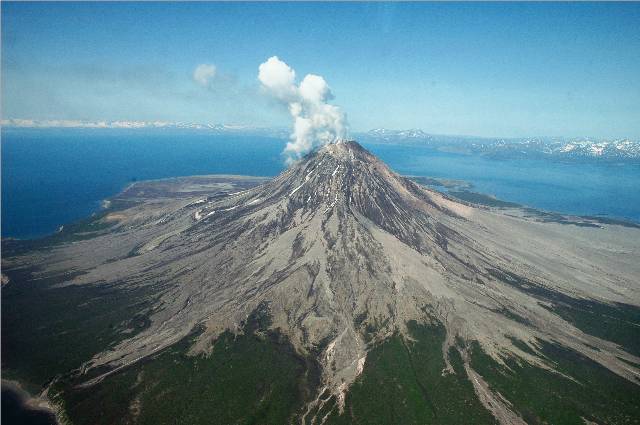
|
| Mt. Augustine |
Play Nights in White Satin music
Price: $450
Includes: workshop, lodging (five nights either Mon-Fri or
Sun-Thur) and meals
(breakfast & dinner at CLCA, sack lunches for field trips). Participants may seek lodging and/or
meals on their own, the price of the workshop is the same.
Up to two nights lodging (no meals) in the Challenger dorms before or after the workshop will be provided
at $50 per person per night. Spouses / friends may stay in dorm for $50 per night (if room available)
Contact Challenger 1-907-283-2000 with credit card information or send checks to CLCA
Credit:
Two credits of UAA / KPC Edu 580 (~$100) may be earned; for additional assignments, an additional
1 credit (~$50) (3 total) may be earned.
Requirements and assignments for the two or three credits are published below.
Registration and payment for credits will take place on the first day of the workshop.
Evaluation
Tools:
Attendance:
50%
Web Page or Power Point Presentation: 30%
Travel log of field trip events: 20%
Attendance:
(-10% per absence)
Power Point
Presentation: A twenty slide power point presentation will be submitted for 30% of the course grade. The instructor must approve
the subject prior to turning in. Each slide should have relevant information and illustrations. The last slide should include references.
The equivalent amount of work may be done on a mhln.com web page. See Alaska
Math & Science Conference 2004 link
Rubric: Quantity (20 slides)
40%
Relevant Content including References 30%
Relevant Illustrations 30%
Possible Topics for Power Point Projects:Volcanism in Alaska and / or
teacher’s local area
Glaciations in Alaska and / or
teacher’s local area
Minerals (i.e. Gold, oil) in Alaska and / or
teacher’s local area
Seismology in Alaska and / or
teacher’s local area
Any topics agreeable to student and instructor.
Extra Credit:
Power Point Presentations may be presented
orally to the class for a +5% bonus.
A second Power Point Presentation may be
submitted for a +10% bonus.
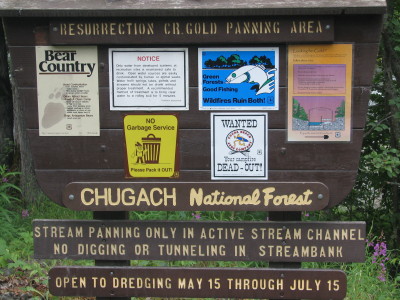
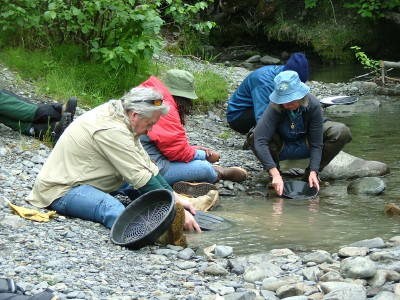
|
| Panning for gold near Hope, AK |
Utilize the Learning Cycle in you presentation. See NSTA article Expanding the 5E Model (web link)
The 5E Model is a framework that guides the student through five levels of investigation in order to provide
multiple, varied opportunities for the student to construct their own understanding by ultimately applying the concept that
is introduced:
Engagement- hands-on activity creates questions, maybe discrepant or
novel event
Exploration- investigate the phenomenon in more detail, trying to explain
relationships
Explanation- vocab, diagraming, small group discussion, teacher input
Extension- use the new understanding, test conclusions, clarify relationships
Evaluation- apply learning to new situation, test understanding through application
While
this style of planning/presentation can take some time to master, it is an excellent method for focusing student learning
on purposeful inquiry, and it creates an environment ripe for "questioning for understanding" using the students' own queries
rather than teacher supplied.
It also provides a framework for the teacher to recognize and observe the student's progression
from investigation to thinking/struggling to productive questioning, and finally to demonstrating understanding via application.
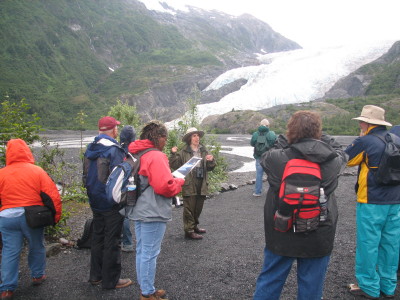
|
| Park Ranger CJ Rae, Kenai Fjords National Park |
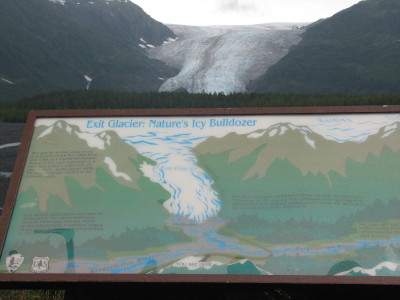
Utilize Earth System Science(ESS)approach in your presentation. See Starting Point: Teaching Geoscience (web link)
Number of Participants:
The workshop is limited to 20 individuals per session .
The Challenger Learning Center of Alaska dorms can house 19 women and 19 men.
Those who pay in full ($450) first will have a reservation. Registration closed on June 20th.
There are only two positions available
Presenters:
Richard D. Reger PhD, Geology
Reger's Geologic Consulting
Bruce L. Rife MS, Biology & Chemistry
Science Teacher;
Kenai Peninsula Borough School District,
Kenai Peninsula College
Text: Roadside Geology of Alaska
and a Rock / Mineral
book of your choice.
Purchase text from Alaska Natural History Association
Transportation:
A school bus will be used for the four days of field trips. This will allow the instructors to address the whole group.
Also caravans of cars are problematic this time of year.
What to Bring:
The dorms have clean mattresses. Bedding or a sleeping bag should be brought. Special clothing for Alaska field trips:
rain gear. rubber boots that reach nearly to the knees, cotton and wool socks, billed caps or wide-brimmed hats, sweater,
sweatshirt, or fleece jackets, wind breaker jacket, cotton or rubber gloves. A day pack is recommended. Binoculars and a
camera are recommended.
Click Here to download Application
Agenda
|
|
Orientation and Background Information
|
|
|
8 - 8:30 am Breakfast
8:30 am Bruce Rife: Introduction; Course description,
registration, and assignments; schedule of events;
hand out of materials.
9 - 10:45 am Jennifer Adleman, Geologist Education,
Alaska Volcano Observatory (see web site below);
Alaska volcanology, Mt. Augustine activity
11 - 12 pm Greg Pitzer, Digital Learning Network Coordinator,
NASA Ames Research Center (see web site below);
Mt. Spur activity, Volcanoes on Earth & Mars
A comparitive study
|
|
|
12 - 1 pm Lunch
1 - 2 pm Dr. Reger, Geologist, Powerpoint Presentations on:
Geologic framework and formation of Alaska and
Kenai Peninsula
2 - 3 pm Bruce Rife: Introduction; Course description,
registration, and assignments; schedule of events;
hand out of materials. Break
3 - 4 pm Dr. Reger, Geologist, Powerpoint
Presentations on:
Glaciers and glacial history of the Kenai Peninsula, Break
4 - 5 pm
Cont. Glacier lecture,Preview discussion
Field trip to
Hope, AK
5 - 6 pm Dinner
6 pm + Free Time
|
|
|
Field trip to Hope to investigate the Kenai Mountains
including the bedrock geology and placer gold.
|
|
|
7:30 - 8 am Breakfast
8 - 10 am Drive to Hope, Alaska
10 - 12 pm Carol Huber & Sheri Nelson, Geologist Education,
United States Forest Service;
Gold Placer Geology and Mining History of the
Northern Kenai Peninsula (see web site below);
|
|
|
12 - 1 pm Lunch
1 - 2 pm Dr. Reger, Geologist, Presentation on: Turnagain Arm
Glacial history, Bore tide, record of past
earthquakes
2 - 3 pm Drive to CLCA, stop at Sterling area,
3 - 4 pm Dr. Reger, Geologist, Presentation
on:
Glaciers and glacial impoundment of meltwater lake
4 - 5 pm Drive to CLCA
5 - 6 pm Dinner
6 - 6:30 pm Preview discussion Field trip
to Seward / Exit glacier
6:30 pm + Free Time
|
|
|
Field
trip to Seward to examine features of a glacier (Exit Glacier) in the Kenai Mountains.
|
|
|
7:30 - 8 am Breakfast
8 - 10 am Drive to Exit Glacier, Seward, Alaska
10 - 12 pm CJ Rea, Education Coordinator,
United States Park Service; (see web site below);
Glacial geology
|
|
|
12 - 1 pm Lunch
1 - 3 pm Free Time in Seward; shopping or
Alaska Sea Life Center $15 per person
(see web site below);
3 - 4 pm Drive to CLCA; stop at Tern Lake
4 - 4:30 pm Dr. Reger, Geologist, Presentation
on:
local glaciation, sackung slope failure, postglacial flora
4:30 - 5:30 pm Drive to CLCA
5:30 - 6:30 pm Dinner
6:30 - 7 pm Preview discussion Field trip
to Kenai / Captain Cook State Park
7 pm + Free Time
|
|
|
Field trip to the beaches north of Kenai (Captain Cook State Park) to
examine evidence of past glaciation and modern coastal processes. Also observe oil platforms in Cook Inlet.
|
|
|
7:30 - 8 am Breakfast
8 - 9 am Open lecture
9 - 10 am Stop at the overlook of the lower Kenai
River,
discuss the evolution of the Kenai River and the
effects of
earthquakes
10 - 11 am Stop at Salamotof;
examine diatomaceous earth and look for agates.
11 - 12 pm Walk Capt. Cook State Park beach, look for agates
|
|
|
12 - 1 pm Lunch
1 - 2 pm presentation on past glaciation and evolution of
Swanson River
2 - 3 pm Drive to CLCA;
3 - 5 pm Open study time
for participant projects
5 - 6 pm Dinner
6 - 6:30 pm Preview discussion Field trip to Homer
6:30 pm + Free Time
|
|
|
Field trip to Homer to examine Tertiary bedrock and evidence of past glaciations.
|
|
|
7:30 - 8 am Breakfast
8 - 10 am Drive to Homer, Alaska, stop at Bluff point,
discussion on geology of Kachemak Bay, large slope
failure, and formation of Homer Spit
10 - 12 pm Walk Bishop Beach and Homer Spit
|
|
|
12 - 1 pm Lunch Lunch (fresh halibut or
salmon) at the
Boardwalk restaurant. Have a drink
at the "Salty Dog"
saloon on the Homer spit.
(own funding, not included with work
shop)
1 - 2 pm Alaska Islands and Ocean NWR (see web site below)
2 - 3:30 pm Drive to CLCA;
3:30 - 5 pm Open study
time for participant projects
Power Point or web page presentations (optional)
5 - 6 pm Dinner
6 - 6:30 pm evaluations
6:30 pm + Free Time
|
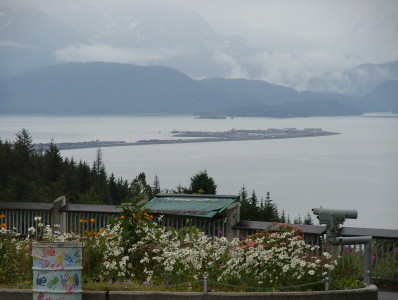
|
| The Homer Spit |
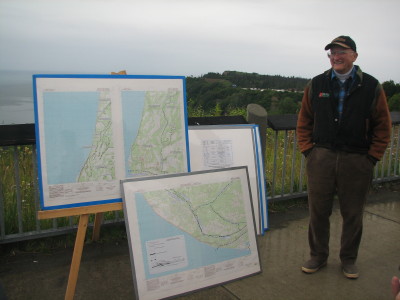
|
| Dr. Dick Reger (thanks for all your time & effort) |
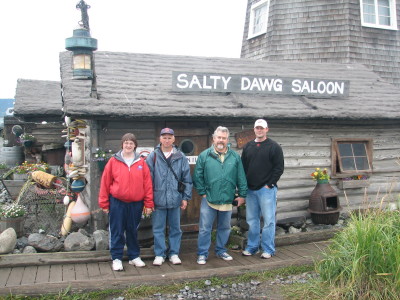
|
| Participants in front of the Salty Dawg Saloon on the Spit |
Alaska
Phenomena Geology Teacher's Institute Standards
National
Science Education Standards Addressed:
Content
Standards, 5-8
Content Standard D:
As
a result of their activities in grades 5-8,
all
students should develop an understanding of
- Structure
of the earth system
- Earth's
history
Alaska
Content Standard D
Concepts of Earth Science
A student
should understand and be able to apply the concepts, processes, theories, models, evidence, and systems of earth and space
sciences.
A student who meets the content standard
should:
- develop
an understanding of Earth’s geochemical cycles;
- develop
an understanding of the origins, ongoing processes, and forces that shape the structure, composition, and physical history
of the Earth;
- develop
an understanding of the cyclical changes controlled by energy from the sun and by Earth’s position and motion in our
solar system;
Teaching Standards
Teaching Standard B:
Teachers of science guide and
facilitate learning. In doing this, teachers
- Focus and support inquiries while interacting
with students.
- Encourage and model the skills of scientific inquiry, as well as the curiosity, openness
to new ideas and data, and skepticism that characterize science.
Professional Development Standards
Professional Development Standard
B:
Professional development for
teachers of science requires integrating knowledge of science, learning, pedagogy, and students; it also requires applying
that knowledge to science teaching. Learning experiences for teachers must
- Connect and integrate all pertinent aspects of science and science education.
- Occur in a variety of places where effective science teaching can be illustrated and modeled,
permitting teachers to struggle with real situations and expand their knowledge and skills in appropriate contexts.
- Address teachers’ needs as learners and build on their current knowledge of science
content, teaching, and learning.
- Use inquiry, reflection, interpretation of research, modeling, and guided practice to build
understanding and skill in science teaching.
Alaska Geology Links:
Alaska Division of Geological & Geophysical Surveys ADNR
* Goldpanning on Alaska's Kenai Peninsula *
Chugach Alaska Corporation Geology
Finding Gold In Alaska Alaska Mining & Diving Supply
* Geology Fieldnotes of Kenai Fjords National Park AK *
Kids Book written by CJ Rea, KFNP Ranger
Cook Inlet Oil & Gas
* Alaska Volcano Observatory *
Alaska Earthquake Information Center
The Pratt Museum Homer Alaska
* Alaska Islands and Ocean Visitor Center Homer AK *
Kachemak Bay Ecological Characterization ADF&G
Denali National Park
Wrangell - St Elias National Park
|
|
|
|
Grade Level / School / Organization |
|
|
|
|
8th gr science, Empire School, Cleveland Municipal Sch Dist |
|
|
|
|
k -12, Starbase Instructor |
|
|
|
|
10-12, Chemistry, Physical Science, Cleveland heights high School |
|
|
|
|
7-8 gr science, Cleveland Municipal Sch Dist |
|
|
|
|
|
|
|
|
|
Program Coordinator, Cleveland Municipal Sch Dist |
|
Julie.A.Gielow@cmsdnet.net |
|
|
|
|
arkan_the_drack@yahoo.com |
|
|
6-8 gr math / science, Buehler Challenger & Science Center Buelhler Challenger Center
|
Washington Twp, New Jersey |
|
|
|
|
|
|
|
|
9-12 gr, Geology, Oceanography, Meteorology, Astronomy, Emmaus High School |
|
|
|
|
|
|
|
|
|
7th gr math, science, social studies, Ladue Middle school |
|
|
|
|
6th gr science, Valley View Intermediate Sch |
|
|
|
|
6th gr science, Ladue Middle School |
|
jsiesener@ladue.k12.mo.us |
|
|
8th gr science, Cleveland School of the Arts |
|
|
|
|
9-12 gr Physical Science, Chemistry, Physics, Advanced Biology, Ellendale Public School |
|
psykora@ellendale.k12.nd.us |
|
|
6th gr science, Estes Park Middle School |
|
|
|
|
9-12 gr Earth Science, Physical Science, East Technical High School |
|
|
Member of National Science Teachers
Association 1984 - present
Member of Alaska Science Teachers Association http://www.aksta.org/index.html
How We Learn Scientific American
College Degrees with the Worst Return on Investment
UTube 2 million unfilled jobs "today" waiting for math science education (CNN Education in America: Don't Fail Me)
ACS Email
UAA Email
Power Teacher
Power School Parent / Student Sign In
Bruce Rife at Facebook
|
|

